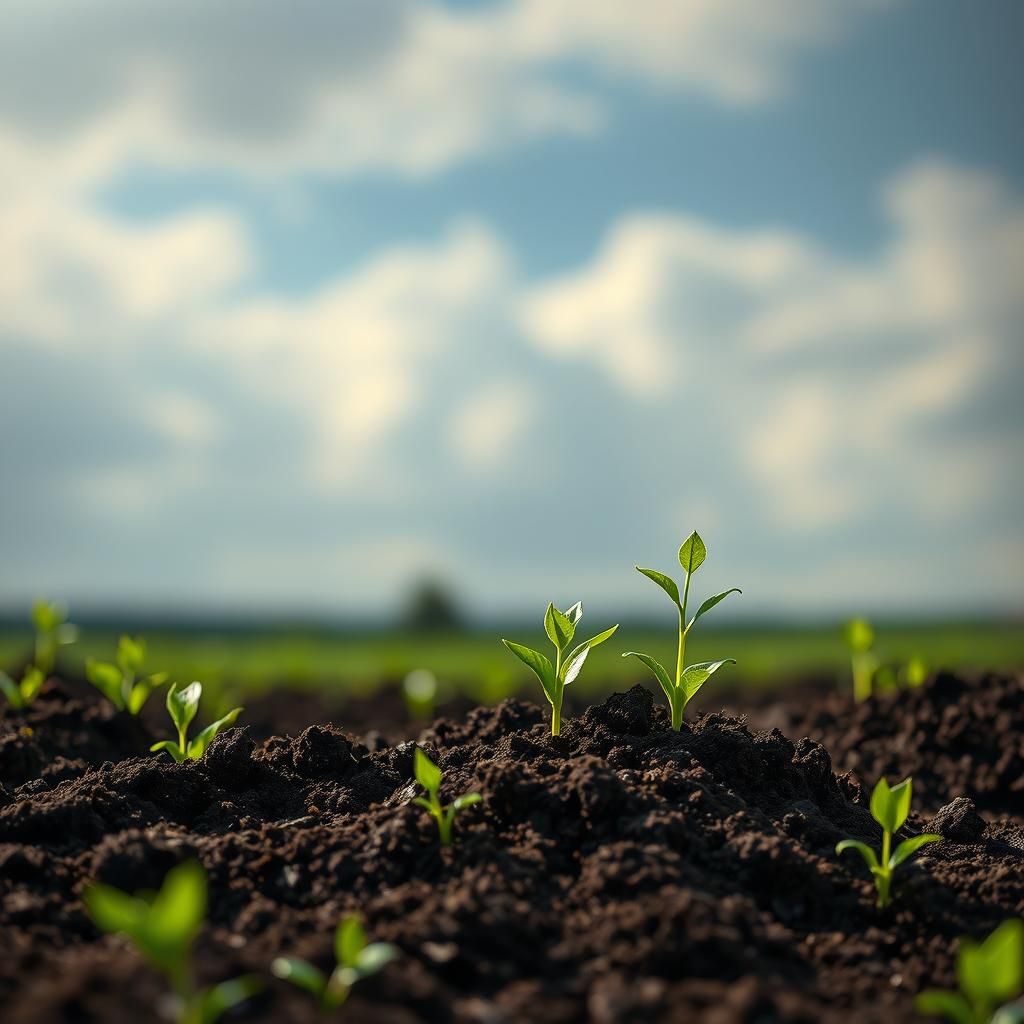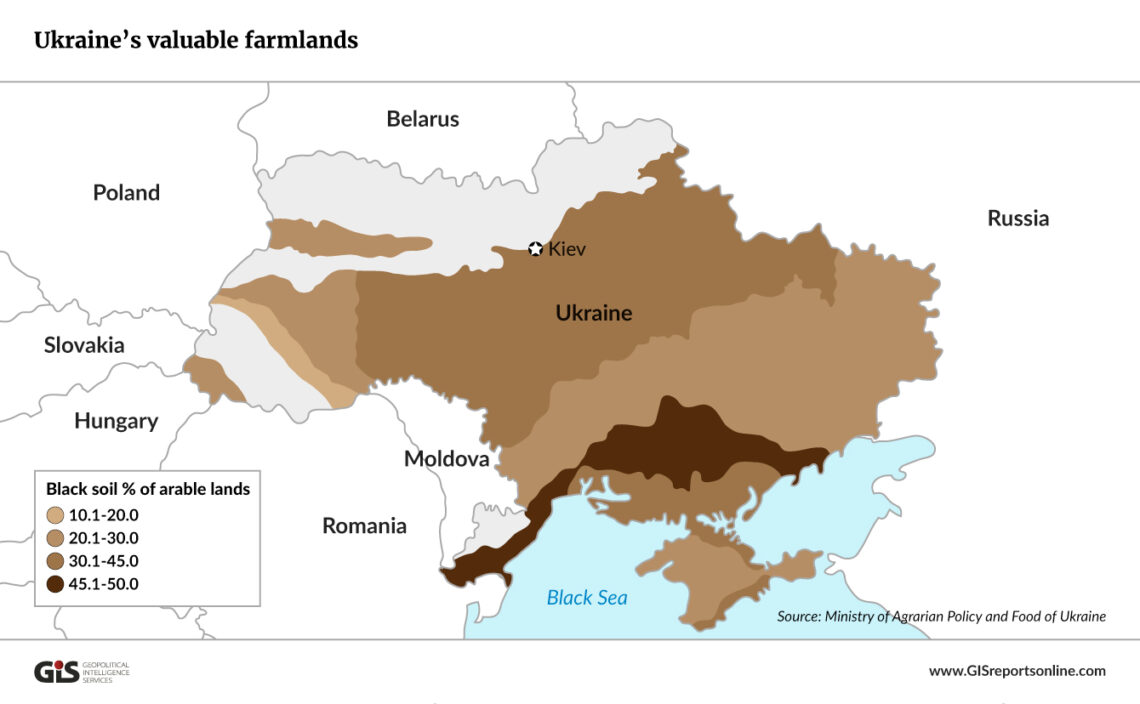Unlocking the Secrets: Why is Ukraine Soil So Fertile?

Ukraine is often referred to as the breadbasket of Europe, a title that reflects its rich agricultural heritage and the remarkable fertility of its soil. This article delves into the secrets behind Ukraine's highly productive land, exploring factors such as its unique geographical features, the composition of its soil, and traditional farming practices. Understanding these elements not only highlights the importance of Ukraine to global food security but also sheds light on the historical cultivation techniques that have sustained its agrarian economy for centuries. Join us as we unveil the mysteries behind the remarkable fertility of Ukrainian soil.
Why is Ukraine's Soil So Fertile?
Ukraine is often referred to as the breadbasket of Europe due to its extremely fertile soil, known as chernozem, which covers a significant portion of the country. This rich black soil is abundant in organic matter and essential nutrients, making it ideal for agricultural production. The formation of chernozem is largely attributed to the region's climate and vegetation history, where the grasslands that once dominated the area contributed to the accumulation of organic materials through die-off and decay. Additionally, Ukraine's flat terrain allows for deep soil profiles, enhancing its capacity to retain moisture and support diverse crops. This unique combination of environmental factors has established Ukraine as one of the top producers of grains and agricultural products globally.
What is Chernozem?
Chernozem, often referred to as black soil, is a rich, fertile soil type known for its high organic matter content. It typically contains between 5% and 10% organic material, which enhances its nutrient availability and improves soil structure. This type of soil is predominantly found in grassland regions like Ukraine and is most favorable for growing crops such as wheat, corn, and barley. The development of chernozem is a slow process that takes thousands of years, showcasing the importance of environmental conditions like vegetation and climate in soil formation.
Climate Factors Contributing to Soil Fertility
Ukraine's continental climate plays a crucial role in the fertility of its soil. The country experiences distinct seasons, including warm summers and cold winters, which help in the decomposition of organic matter, returning nutrients to the soil. The annual rainfall, which ranges from 450 to 750 mm, also provides adequate moisture for crop growth and soil preservation. These climatic conditions, combined with fertile soil types, create an ideal environment for agriculture.
Significance of Soil Organic Matter
Soil organic matter is vital for maintaining the fertility of Ukrainian soils. It improves soil structure, enhances water retention abilities, and supports microbial life that assists in nutrient cycling. The decomposition of organic materials contributes to a stable supply of nutrients, which is essential for sustaining agricultural productivity. Without sufficient organic matter, soils can become depleted, leading to reduced crop yields over time.
Impact of Agricultural Practices
Agricultural practices in Ukraine greatly influence soil fertility. Traditional farming methods focus on crop rotation and minimal soil disturbance, which help maintain the integrity of the soil structure and prevent erosion. The adoption of modern technologies, such as precision agriculture, also aids in optimizing fertilizer use and improving crop outputs while safeguarding soil health. These practices not only enhance productivity but also ensure the long-term sustainability of fertile lands.
The Role of Vegetation in Soil Formation
Vegetation plays a pivotal role in the formation and maintenance of fertile soil in Ukraine. The natural grasslands have historically contributed to the build-up of organic matter through the continuous growth and decay of plant roots and stems. This vegetation not only protects the soil from erosion but also contributes nutrients that enhance soil fertility. Effective land management that preserves and promotes natural vegetation is essential for maintaining the fertility of Ukrainian soils in the face of agricultural expansion.
| Soil Type | Organic Matter (% content) | Ideal Crops |
|---|---|---|
| Chernozem | 5-10% | Wheat, Corn, Barley |
| Podzol | 1-3% | Potatoes, Berries |
| Clay Soil | 2-4% | Rice, Cotton |
Why is Ukraine so good for farming?


Ukraine is often recognized as one of the most fertile countries in the world, primarily due to its rich agricultural landscape, favorable climate, and extensive arable land. This country is a significant player in the global agricultural market, predominantly for its production of grains and other staples. Below are several reasons that contribute to Ukraine's agricultural success.
Fertile Soil
The chornozem soil, renowned for its high nutrient content, covers a substantial part of Ukraine's agricultural land. This type of soil is particularly effective for farming due to the following reasons:
- High Organic Matter: The organic matter content in chornozem is significantly higher compared to other soil types, enhancing plant growth.
- Excellent Drainage: This soil type has good drainage properties, allowing for effective water retention, which is vital for crops.
- Rich Nutrients: Chornozem is rich in essential nutrients like nitrogen, phosphorus, and potassium, making it ideal for cultivating a wide variety of crops.
Favorable Climate
Ukraine experiences a continental climate, which is generally favorable for agriculture. Several climate-related factors that contribute to its agricultural success include:
- Moderate Temperatures: Warm summers and mild winters promote optimal growing conditions for many crops.
- Ample Rainfall: The country receives sufficient rainfall throughout the growing season, which is critical for crop development.
- Seasonal Variability: The distinct seasons allow farmers to rotate crops and improve soil health over time.
Extensive Arable Land
Ukraine boasts a vast amount of arable land, which is crucial for its status as a farming powerhouse. Some aspects of its land use include:
- Large Agricultural Area: Approximately 70% of Ukraine's territory is agricultural land, making it ideal for large-scale farming.
- Diversity of Crops: The large area under cultivation allows for a diverse range of crops, from grains to fruits and vegetables.
- Potential for Expansion: There are still areas suitable for conversion into arable land, which presents opportunities for increased agricultural production.
Agricultural Technology and Practices
Ukrainian farmers are increasingly adopting advanced agricultural technologies and practices, improving efficiency and yields. Key factors include:
- Modern Machinery: The use of modern farming equipment and machinery reduces labor costs and enhances productivity.
- Precision Agriculture: Technologies such as GPS and drones are utilized to monitor crop health and optimize field management.
- Research and Development: Ongoing research in crop science contributes to better seed varieties and sustainable farming practices.
Strategic Location
Ukraine's geographic location plays a significant role in its agricultural viability, particularly for trade. Important aspects include:
- Access to Markets: Proximity to major European markets facilitates the export of agricultural products.
- Transport Infrastructure: Well-developed infrastructure, including railroads and ports, enhances distribution efficiencies.
- Trade Agreements: Various trade agreements with other countries promote agricultural exports, expanding market reach.
Why is Ukraine so arable?

Ukraine is often referred to as the breadbasket of Europe due to its vast arable land and favorable agricultural conditions. Several factors contribute to this remarkable agricultural productivity.
See also:
Geographical Advantages
The geographical location of Ukraine plays a significant role in its agricultural success. Positioned in Eastern Europe, it has fertile plains and a temperate continental climate. Key geographical factors include:
- Chornozem Soil: Ukraine is home to one of the most fertile soils in the world, known as black soil or chernozem. This soil is rich in organic matter and nutrients, making it ideal for growing crops.
- Flat Terrain: The country consists mainly of flat plains, which are easier to cultivate compared to mountainous regions. This allows for efficient farming and larger agricultural operations.
- Climate: The continental climate provides warm summers and adequate rainfall, fostering favorable growing conditions for a variety of crops.
Crop Diversity
Ukraine's agricultural sector is characterized by a wide variety of crops that can be grown due to its diverse climatic zones, leading to a robust economy and food security. Key aspects include:
- Cereal Production: Ukraine is one of the top producers of grains, especially wheat, barley, and corn, which are staples for both domestic consumption and export.
- Oilseeds: The country is also a significant producer of oilseeds, particularly sunflower oil, which ranks as one of the largest exports.
- Vegetables and Fruits: The diverse climate allows for the cultivation of various vegetables and fruits, enhancing biodiversity in its agricultural output.
Agricultural Technologies
Technological advancements in agriculture have enabled Ukraine to maximize its land use and productivity. Important technological contributions include:
- Modern Farming Equipment: The adoption of advanced machinery, such as tractors and automated planting equipment, has increased efficiency in cultivation and harvesting.
- Precision Agriculture: Technologies such as GPS and satellite imaging help farmers make informed decisions regarding planting, irrigation, and fertilization.
- Seed Innovation: Research and development in crop genetics have led to the creation of high-yield and pest-resistant seed varieties, enhancing overall productivity.
Agricultural Policies
Ukrainian government policies have historically supported agricultural development, making the sector a backbone of the economy. Key policy aspects include:
- Subsidies and Support: Government subsidies for seeds, fertilizers, and equipment have incentivized farmers to increase production and improve techniques.
- Land Reforms: Efforts to reform land ownership and management have encouraged investment in agriculture, leading to better use of arable land.
- Export Promotion: Policies aimed at promoting agricultural exports have opened international markets, giving farmers access to global demand.
Historical Agricultural Practices
Ukraine has a long history of agriculture, which has shaped its current practices and land use. Historical factors include:
- Cultural Heritage: The agrarian lifestyle is deeply rooted in Ukrainian culture, emphasizing traditional farming practices that have been passed down through generations.
- Collectivization Era: During the Soviet era, agriculture was organized under collective farms, which influenced modern farming methods by ensuring a focus on large-scale production.
- Knowledge Sharing: The accumulation of agricultural knowledge over centuries has led to improved crop management techniques that heighten productivity.
Questions from Our Readers
Why is Ukraine's soil considered some of the most fertile in the world?
Ukrainian soil is renowned for its fertility primarily due to the presence of chernozem, a rich black soil high in organic matter. This unique soil type is formed from the decomposition of plant material and has excellent nutrient retention properties, making it ideal for agriculture.
What factors contribute to the fertility of Ukraine's soil?
Several factors enhance the fertility of Ukraine's soil, including its climate, which features adequate rainfall and a warm growing season, as well as its natural topography that supports good drainage. The historical practices of crop rotation and natural replenishment of nutrients also play crucial roles in maintaining soil health.
How does Ukraine's fertile soil impact its economy?
The fertile soil of Ukraine significantly boosts its economy, particularly in the agricultural sector. Ukraine is one of the world's largest grain exporters, and the ability to produce high-yield crops like wheat and corn contributes greatly to its overall economic stability and growth.
See also:
Yes, while the fertile soil in Ukraine supports extensive agriculture, there are concerns about soil degradation, resulting from practices like over-farming and the use of chemical fertilizers. These practices can lead to a decline in soil health and biodiversity, prompting the need for sustainable farming practices to preserve this vital resource.

If you want to read more articles like Unlocking the Secrets: Why is Ukraine Soil So Fertile?, we recommend you check out our Soil category.
Leave a Reply
Related Articles